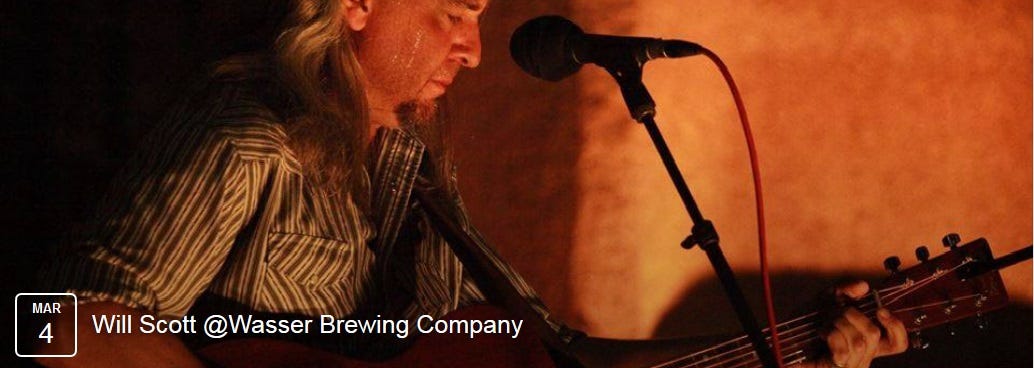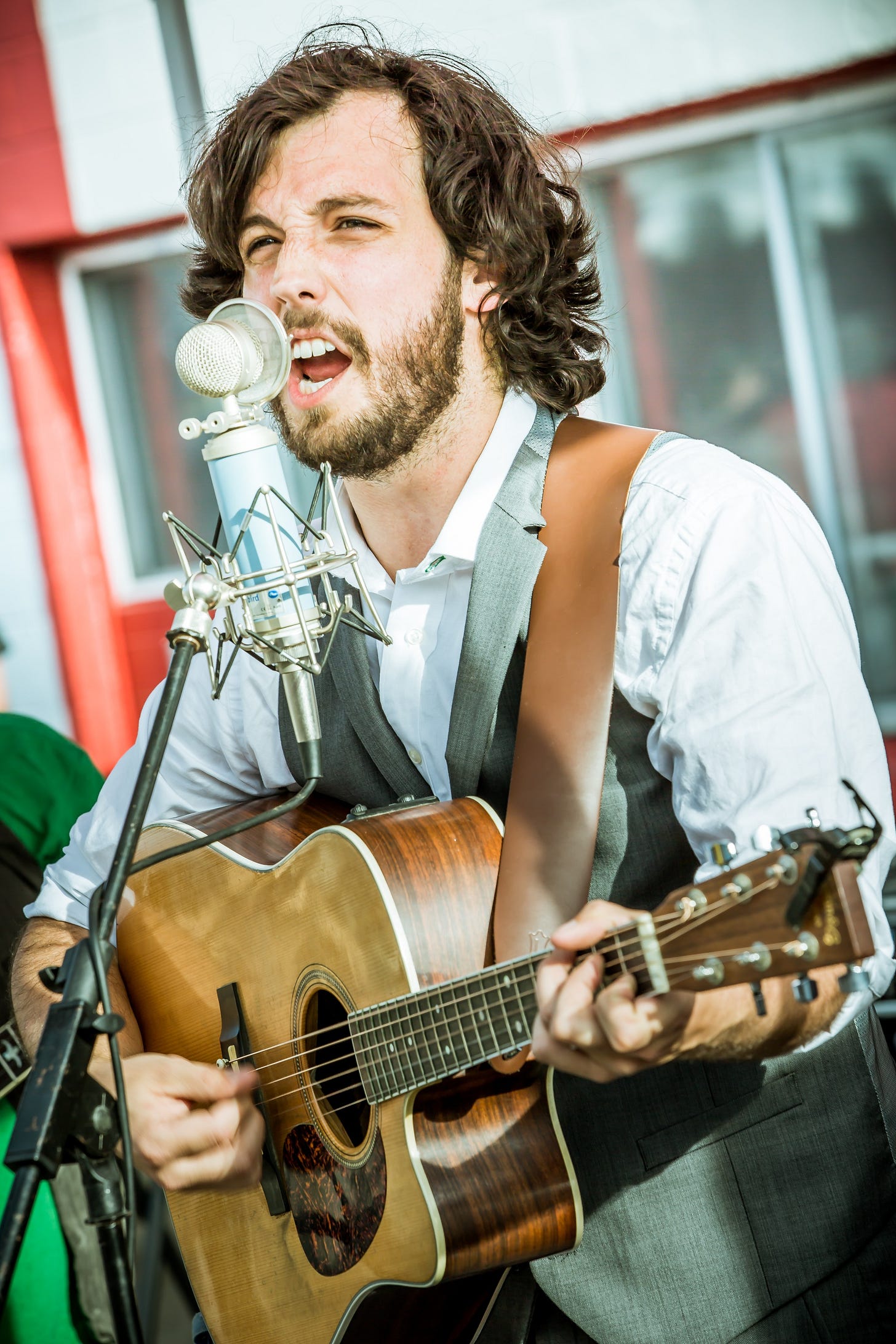Conversations: Chris Dollar
by Donovan Wheeler photos by Garrett J. Poortinga, Green Hat Media LLC 2017
[box type="info" align="aligncenter" class="" width=""]Chris Dollar @ Wasser Brewing Company -- February 24th[/box] [dropcap]A[/dropcap]t their peak, Bloomington's New Old Calvary, a traditional bluegrass band with creative, nontraditional elements were touring the Midwest and putting out recorded music hand-over-fist. In the middle of it was Chris Dollar. Last year he released his second solo album, almost a decade after his first individual recording stint and nearly two years since the New Old Calvary's last album. A natural baritone with an adept ability to climb octaves, Dollar's musical skills will be on full display at the end of the month, when he makes his February 24th appearance at Wasser Brewing Company in Greencastle. Donovan Wheeler: Tell me about your youth. Where did you grow up? What was your childhood like, and how and when did you discover music? Chris Dollar: "My family is originally from Pittsburgh, but we've lived in Indiana since I was 10, so I'm pretty sure I'm a full blown Hoosier now. We were a musical family growing up. We had a piano that my mother and sister played, and my dad had been in percussion in his high school days. We listened to a lot of music growing up. I am the first, that I know of, that is playing music for a living though." DW: Explain a little bit what you mean when you say the New Old Calvary performs "non-traditional bluegrass in a traditional format." CD: "The New Old Cavalry played original material and covered non-traditional bluegrass songs, but we still always stayed true to the bluegrass form. We were a string band (no drums) that would create the full sound of everyone doing something a little different together, pass around solos on the melody, and scream out some three part harmonies. These things, to us, were some of the fundamentals of bluegrass style." [divider style="solid" top="20" bottom="20"]
[divider style="solid" top="20" bottom="20"]

[divider style="solid" top="20" bottom="20"] DW: What is it about the string/blues style you find appealing, as opposed to gravitating toward more typical, electrical band instruments? CD: "I actually started out on electric guitar after playing trumpet through grade school. My buddy's amp had an acoustic simulator setting that I found myself using all the time. I really enjoyed the 'fake' acoustic sound so I saved up and bought a used acoustic from the music shop where I lived. That was about three years into guitar for me, now going on 15. Don't get me wrong, it's hilariously fun to be really loud. I've still got a 100-watt Marshall Valvestate at home that gets out every once in a while, but I truly just fell in love with the acoustic 'string-band' sound. Plus, if the power goes out, the bluegrass band still gets to play!" DW: What prompted you to break away and do solo work? CD: "Today, I am able to play solo gigs, sit in with all different groups, put together ensembles, record and produce my own albums, work with a wide array of musicians, record other musicians, and still even play the now-occasional New Old Cavalry Show. So, I really wanted a chance to work on all types of projects to better myself as an artist. We were working very hard all the time with the NOC, but it was time to take a break and work on other things." DW: How do you balance your solo work with your band duties? CD: "The Chris Dollar Band has to get booked very far in advance since everyone is in one or more other great projects that stay booked. Most of the shows I book right now are solo and duo shows. If a venue offers a guarantee that enables me to hire the band, fantastic. I love to pay musicians when I can, its a great feeling. And these guys are worth a lot to me. So that being said I use the solo shows to stay booked and keep playing when the numbers are low. Plus, I think the solo shows are just as good as the full band experience, in its own way of course." [divider style="solid" top="20" bottom="20"] [divider style="solid" top="20" bottom="20"]

[divider style="solid" top="20" bottom="20"]

[divider style="solid" top="20" bottom="20"] DW: How does operating out of Bloomington work out? Does it serve as a good HQ for you and your band? CD: "Bloomington has a pretty welcoming music community, and it's growing. I'm seeing more small 'listening room' type venues popping up all the time. It's also pretty central to a lot of major cities. All within four hours: Chicago, Cincinatti, Louisville, Lexington, St. Louis, and a lot more. So far though, it's been hard finding available musicians to play with. As they say 'If you're good, you're busy.' There's just not the numbers of a large city here, so naturally there's a little less of everything." DW: Tell me a little bit about the band mates featured in the tracks of your new record Away Away. CD: "Sean First (Bass) was our bass player for the last year of the New Old Cavalry. He's from Louisville, and he continues to help me out when we've got the budget for the full band. John Bowyer (Mandolin) plays in several groups in the Brown County area, the most popular being The Hammer and The Hatchet, a great duo act. He's got a chop like a mad man if you know what I mean. Johnny Plott (Banjo) gigs with Flatland Harmony Experiment from Indianapolis as well as many other groups, too. He's a great banjo player AND a great singer AND a great songwriter. Dylan Hawf (Fiddle) lived in southern Illinois when we recorded the album. He now lives in Arkansas but is still able to make it up here for gigs when the time is right. He's a fantastic fiddle player who has a taste for that Texas swing as well as bluegrass." DW: How would you characterize your development when you listen to your 2007 solo album, Acoustic Currency, versus your new record? CD: [Laughs] "I usually don't think about Acoustic Currency at all. I knew so little back then, but it was a big first step that got me going. When I recorded that back in 2007 I was just playing 'what sounds good.' I've always relied on my ear for a lot. But today in the new record, I'm breaking into producing and focusing on a definitive melody in each piece, as well as what each instrument is doing. I'm doing all of that, and I'm also organizing people to work together." DW: Tell me a little bit about your songwriting process. How do your ideas come to you? Do you develop the melody first, or do you start with the lyrics? CD: "Honestly, it's a little different every time. I just know that when I hear a good part in my head (melody or lyrical), I'll start with that and try and build on it. But there are even some occasions where I sit down and an entire song just comes out. You just have to be ready for anything." DW: Several of your songs in your new album reinforce the idea conveyed in the record's title track, "Away Away," which seems to talk about traveling long distances, an eagerness to leave home in some cases, a sense of sorrow about it in others. Is this a theme/motif common in bluegrass as a genre, or does this recurring idea mean something more to you personally? CD: "My wife and I bought a '98 Dodge Ram B3500 and fixed it up into an RV. Last summer, right after we released the album, Ayla and I (and our dog) took to the open road for over two months. These songs were sort of my own self motivation during preparation for the trip. Ten thousand miles later and all we want to do is travel more." [divider style="solid" top="20" bottom="20"] [divider style="solid" top="20" bottom="20"]

[divider style="solid" top="20" bottom="20"] DW: One my favorite tunes on your new record is "Three Seasons." I absolutely love that track. Am I wrong when when I say that this song is an example of one of those "nontraditional" blues tunes? CD: "This song is an example of one of those 'nontraditional' tunes. It's much more of a 'newgrass' type song. The instrumentation is there, but it's not traditional bluegrass by an means. Bill Monroe would not be proud." DW: I also love the lyricism in "Three Seasons" as well. Do you find that songs leaning more heavily on symbolism and abstractions appeal to you more than the more concrete narratives in other songs? CD: "I use symbolism and metaphor a lot because I think the emotion behind it can transfer more easily for the listener. Every song I write has a special meaning for me personally, but I like to leave room to interpret." DW: Are you like many musicians in the area, balancing your work on stage with a "secret identity" working an average day job? Or do you live on your work as a musician? CD: "There have been times where I've been able to live just off playing music, but those 'moments' have been few and far between. I am very happy with my current day job though. I work at Indiana University for MEMNON, digitizing old media (records, reel/reel, cassette, 78s, etc.). So I listen to a lot of different music all the time. It keeps me sharp I suppose. Plus, they are very supportive of musicians and the artful type. They're great people to work for." DW: Where would you like to take your music in the next few years? Any specific goals in terms of touring and future records? CD: "I hope to keep building my craft and keep writing songs I think you'll like, for as long as I'm going. As a musician I just want to be fun to pick with...to anyone of any skill level, professional or amateur. As long as I keep striving to get better and keep producing good content, I think it just might work." DW: Tell me anything else you would like to say, which I have forgotten to ask. CD: "Stay tuned for a new album. We're in the very beginning stages, but the material is coming together and I'm really excited for it! Thanks for the interview!" [divider style="solid" top="20" bottom="20"]
[divider style="solid" top="20" bottom="20"] [author title="About Donovan Wheeler" image="https://scontent-ord1-1.xx.fbcdn.net/v/t1.0-9/13413045_10206476443925016_3719335501835627694_n.jpg?oh=b3c2dd713a7e1d8c1dbbdc8f07189b18&oe=5902C626"]Wheeler proudly teaches AP Literature and AP Language to some bright and lovably obnoxious kids in a small college town. He is the senior editor for the craft beer website Indiana on Tap, and he also writes for ISU’s STATE Magazine, NUVO News, VisitIndiana, and the Putnam County CVB. Since putting in a pool he can now dive in head first (with goggles), and he has mostly stopped throwing golf clubs, but he still hates to fly.[/author] [divider style="solid" top="20" bottom="20"]

[divider style="solid" top="20" bottom="20"]



